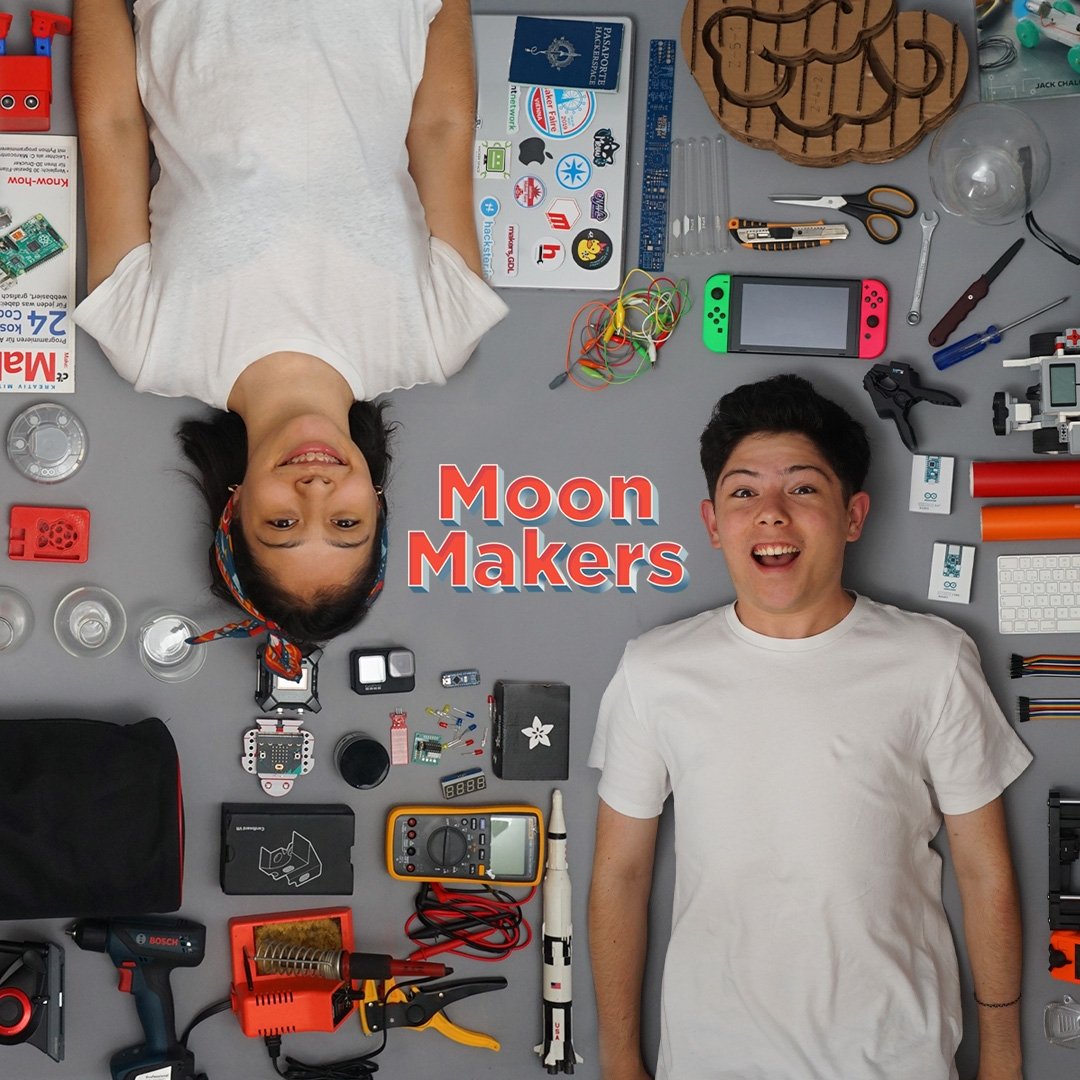Making With Impact
Published on July 8th, 2024
Camila and Diego Luna—better known as MoonMakers—are on a mission to make STEAM education more engaging and accessible for learners of all ages around the world. The vibrant and charismatic sister-brother team from Mexico City launched an ambitious YouTube channel dedicated to activating youth in the maker movement almost a decade ago, when they were just kids themselves. Now nearing the end of their university studies, they stand at the threshold between youth and adulthood with an up-close view of the shifting landscape of technology in education—and a palpable desire to play a pivotal role in the ongoing transformation.

Expanding access to education is topmost on their agenda. As Diego explains, “We started putting our content on YouTube because we wanted this to be accessible to everyone. And that's how we get involved in the process of working with teachers.”
“We collaborate on many projects with various educators and institutions around the world,” adds Camila. “We are trying to do our best job to make more accessible and more specific content for teachers. We help them to actually develop resources for the classroom to use the technology in a personalized way for their students.”
And their commitment to access also takes into account differences in learners’ ages and language proficiency. “We work in English or in Spanish, depending on the community,” says Diego. “When it comes to science and technology in education, there’s often a language barrier—at least here in Mexico—because many of the resources are in English. So, we try to provide resources in both languages.”
“We like that diversity,” says Camila. “And I really like that we work across a lot of grades, too. We have done stuff with university students, and we also work with really young kids—even kindergarteners. It’s a really interesting work experience. One of my favorite parts of bringing project-based learning to kids is actually seeing them develop other skills that are not directly connected to the technical skills.”
“We help them develop soft skills,” explains Diego. “These are so important when you communicate with another person or when you work with a team.”
Of course, when it comes to influencing the development of young learners, a bit of internet fame doesn’t hurt. Camila shares a touching example of her impact as a public role model: “I had a really lovely moment once when I gave a talk at a Maker Faire. A girl came up to me and said, ‘You know, I wasn't going to keep studying. I was going to finish my high school, and that would be it. But then, I heard you, and I thought these subjects sounded really interesting. Now, I’m thinking about how I can start learning new things and be involved in different stuff. I want to study the same things as you because I think you're really cool!’”
Interactions like that help both siblings remain optimistic about the future of STEAM education at a time when many are wondering whether technology—especially such headline-stealing innovations as generative AI—holds too much sway over learning environments. “We feel positive,” says Diego. “These tools are like a superpower for students.”
“And,” Camila adds, thoughtfully, “I think it's important to acknowledge that these different forms of technology really are just tools. We need to help students find ways to use these tools to generate a positive impact in their lives. Maker education is about developing critical-thinking skills, curiosity, and a problem-solving mentality. AI is changing the way we learn and the way we teach—everything, actually. So, teachers and students need to know how it works and how we can use that knowledge to solve problems. A great way to stay positive, regarding the future of technology, is to actually be involved in the change. Students and educators both need to understand the tools. And it goes beyond education. It’s about empowering communities, using the tools to make an impact. You see this in the different communities that Fab Labs are in.”
“That’s what makes the maker community so amazing,” enthuses Diego. “It's a community where you can find your place in the world. You can find people to explore new concepts with. And everyone can be part of the change taking place with technology.”
At FAB24 México, MoonMakers will have a chance to share their knowledge and engage directly with students, teachers, and the broader Fab Lab community. The dynamic duo will be bringing their infectious positivity and enthusiasm for maker education to Puebla just a few weeks from now.
“We're excited to share some of our ongoing projects related to AI in education,” shares Camila. “Our workshop is designed to be interactive and collaborative and foster a real sense of learning. But, we want this experience to be more dynamic. So we're going to have a different kind of conversation. We’ll even have some philosophical questions about the nature of AI.”
Diego offers an open invitation to all FAB24 participants: “Let's explore something new together! This will be an amazing opportunity for everyone. People will be coming from every part of the world. And this only happens one time per year. So, we need to really enjoy the time together, learn from each other, and continue to make an impact.”
Keep an eye on the FAB24 program schedule so you don’t miss their Fab Blast Beyond the Classroom: Innovative STEM Learning with Moonmakers or their Hands-On Workshop Integrating Technology in Education: AI.
And, if you’re lucky, you may catch them recording an episode of the MoonMakers Podcast during the event as part of their collaboration with our partners at IDIT Ibero Puebla.